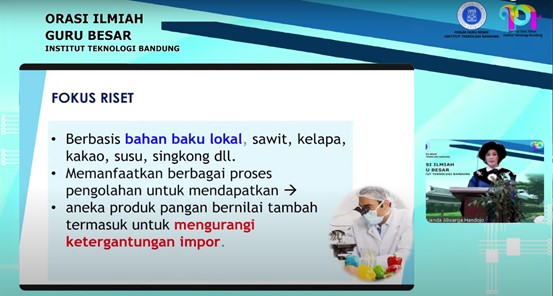
BANDUNG, itb.ac.id—Prof. Lienda Aliwarga Handojo as a professor of Food Processing Technology Science, Faculty of Industrial Technology, ITB, explained various researches and studies that have been carried out. The presentation was held on Saturday (11/12/2021) along with the scientific oration she delivered.
Prof. Lienda’s research focuses on research based on local raw materials such as palm oil, coconut, cocoa, cassava, etc. The research process is carried out by utilizing various processing processes to obtain various value-added food products including reducing dependence on imports.

The first research conducted was a calcium soap animal feed supplement. The purpose of this study is to reduce imports of Indonesian milk by increasing the productivity and quality of local cow’s milk. Calcium soap or often known as calcium fat, is obtained from the reaction of Palm Fatty Acid Distillate (PFAD) with lime. PFAD is a by-product of the Crude Palm Oil refining process which is very abundant in Indonesia.
This supplement can significantly increase the productivity of dairy cows’ milk, including its quality. The test results show that the quality of the calcium soap produced is slightly superior to similar products on the foreign market. This research has been stated in the form of 3 patents.

Next is the study of fermented cassava flour (fercaf). This research succeeded in developing fercaf which functions as food diversification or as a substitute for imported wheat flour. The results of this research have obtained a patent and were applied by PT Cassava Industri Estat Tujuh Sembilan in 2017 who produces fercaf on a commercial scale.
Several other studies have also been successfully carried out. Processing whey for nutritious drinks, for example. Whey which is a cheese factory waste still contains about 6 grams of protein/liter so it can be processed to produce nutritious drinks. “Coconut water processing for ready-to-drink drinks uses membrane technology. As well as processing stevia leaves as a source of low-calorie natural sugar,” he said.

In addition to the research previously mentioned, adaptation of new technologies (novel processes) for food processing was also carried out. Pulse Electric Field for preservation of avocado paste and ginger paste. Because as is known, avocado is a fruit that is not heat-resistant so that thermal preservation cannot be done. There is also an edible coating that can be used to extend the shelf life of the fruit.
Prof. Lienda conveyed several messages about the potential of the food industry in the future. “There will still be a variety of new technologies that require refinement through various studies. The success of research in universities cannot go alone. Synergy from all stakeholders is needed in preparation for Indonesia to compete and face global challenges in the food industry in the future,” said Prof. Lienda.
Reporter : Anastasia Meliana (Pharmaceutical Science and Technology, 2019)

